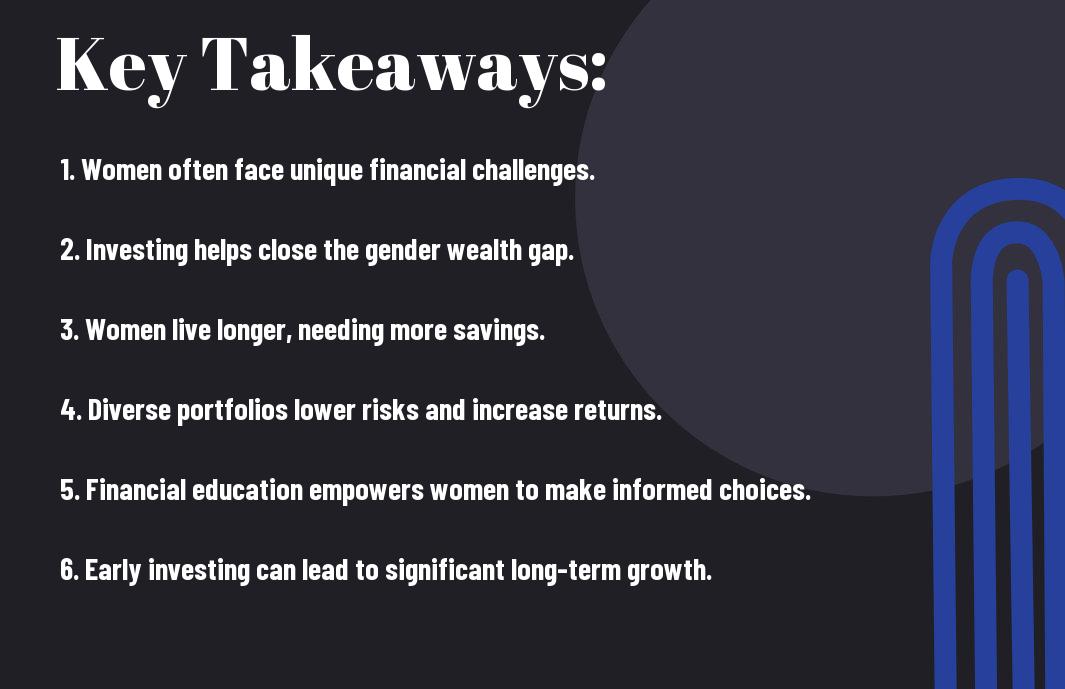It’s important to recognize that women often face unique financial challenges and opportunities. Understanding these differences can help you make smarter investment choices tailored to your needs. By breaking financial stereotypes, you can empower yourself to take control of your financial future and build wealth effectively. This post will explore why a different approach may be beneficial for you and highlight strategies to help you succeed in your investing journey.

Key Takeaways:
- Women often live longer than men, so planning for retirement requires different investment strategies to ensure financial security throughout their lives.
- Women are underrepresented in financial decision-making roles, making it important for them to take charge of their own investments and financial education.
- Embracing a long-term perspective in investing can help women build wealth over time, countering stereotypes that suggest they should take a conservative approach to money.

Understanding Financial Stereotypes
The world of finance is often shaped by stereotypes that can limit women’s approach to investing. These stereotypes suggest that women are less capable of managing money, leading to missed opportunities. Here are key points to consider:
- Women tend to be perceived as risk-averse investors.
- Financial decisions are often assumed to be better suited for men.
- Women may believe they need extensive financial knowledge before investing.
- There’s a stereotype that women prioritize family over individual wealth.
- Many think women are less interested in financial markets.
This perspective can prevent women from taking charge of their financial futures.
| Financial Stereotype | Common Belief |
|---|---|
| Risk Aversion | Women avoid risky investments. |
| Lack of Knowledge | Women need more education before investing. |
| Interests | Women care less about stocks and finance. |
| Decision-Making | Financial decisions are better left to men. |
| Priorities | Women prioritize family over personal finance. |
Historical Perspectives
Any understanding of financial stereotypes begins with history. Traditionally, women did not have access to financial resources. They were often excluded from investment discussions and decision-making. This pattern has left a lasting impact, making financial independence more challenging for many women today.
Modern Misconceptions
Below are some modern misconceptions about women and investing. Many people still believe that women are not interested in finance or that they lack financial skills. These views can discourage you from pursuing investment opportunities. It’s imperative to recognize that these beliefs are outdated and inaccurate.
Indeed, many successful women have thrived in the financial world. Studies show that women often outperform men in investment performance when they do invest. The misconception that you lack financial knowledge or interest can hold you back from achieving financial independence. Embracing your potential and challenging these stereotypes can lead to a more secure financial future.
Key Takeaways
- Recognize financial stereotypes that affect women.
- Challenge outdated misconceptions about investing.
- Empower yourself by learning about finance.
- Engage in investment opportunities that interest you.
- Understand that you have the ability to create wealth.

The Importance of Investing
Assuming you want to take charge of your financial future, investing is crucial. It allows your money to grow over time, helping you build security and financial independence. Unlike saving, which typically earns low interest, investing can lead to higher returns. This is especially important for women, who often earn less than men but need to accumulate wealth for their goals. By understanding the value of investing, you can break free from financial stereotypes and achieve your dreams.
Building Wealth
Importance of investing lies in its ability to help you build wealth over time. When you invest your money, you put it to work, allowing it to grow. For instance, if you start investing early, even small amounts can turn into significant savings due to compound interest. This is especially vital for women, who may face challenges like career interruptions or longer lifespans. By focusing on building wealth, you can secure a better future for yourself.
Achieving Financial Goals
By investing wisely, you set yourself on a path to reach your financial goals. Whether you want to buy a home, fund your children’s education, or plan for retirement, investments can help make those dreams a reality. The earlier you start, the more time your money has to grow. You can choose from stocks, bonds, or mutual funds to align your investments with your goals. This strategy enables you to measure your progress and make adjustments along the way.
Achieving your financial goals does not happen overnight, but investing can make it possible. As you set specific targets, understanding your risk tolerance and time horizon is important. For example, if you’re saving for retirement, you may want to invest more aggressively when you’re younger. As you get closer to your goal, you can shift to safer investments to protect your savings. Regularly review your investment plan to stay on track and reach those milestones successfully.
Women and Investing: Current Trends
Now, let’s explore the current trends in women and investing. Women are starting to take charge of their financial futures more than ever. Studies show that female investors are increasing in number and becoming more confident in their decisions. This shift is significant as it highlights the growing recognition of women as key players in the financial world. Understanding these trends can help you make informed choices about your own investment journey.
Statistics on Women’s Investments
Investing data reveals that women are gradually closing the investment gap. Recent surveys indicate that women are now managing about 40% of the world’s wealth. Furthermore, more than 60% of millennial women are actively investing, showing a shift in mindset towards financial independence. This data not only reflects women’s growing participation in investing but also suggests a trend of increased financial literacy among women.
Differences in Investment Approaches
Before you explore investing, it’s important to understand that women often approach investing differently than men. Research indicates that women are generally more risk-averse and tend to focus on long-term gains. They may prioritize safety and stability over chasing high returns. This careful approach leads many women to choose investments that align more closely with their values.
At the same time, these differences can also present opportunities. For instance, women often conduct thorough research before making decisions. This diligent approach can lead to better outcomes in their investment choices. By leveraging these unique perspectives, you can cultivate a more balanced and thoughtful investment strategy that reflects your goals and values. Embracing your style can empower you to make more confident and personalized financial choices.

Barriers to Investment for Women
Keep in mind that investing can be a daunting experience for many women. Barriers like social norms and a lack of confidence often hold them back. Learning about these challenges is the first step to overcoming them. For more information, you can read about breaking financial stereotypes: Women aren’t bad with money.
Social and Cultural Factors
One reason women might hesitate to invest stems from deep-rooted social and cultural beliefs. These beliefs often result in discouragement. Here are some common factors:
- Misconceptions about women’s financial abilities
- Traditional roles that prioritize caregiving over financial growth
- Limited encouragement to take financial risks
This can create a cycle where women feel less empowered to invest.
Lack of Representation and Knowledge
Below the issue of limited investment knowledge is the lack of representation in financial industries. This gap can make it harder for you to find relatable mentors or sources of information. When women do not see themselves in financial roles, it can discourage them from pursuing their own investment goals.
Representation in financial sectors is important for encouraging women to invest. Without female role models, you may struggle to find guidance tailored to your experiences. Additionally, educational resources often focus on male perspectives, which can leave you feeling excluded. By increasing female representation and access to accurate information, you can build your investment confidence.
Tips for Women to Invest Effectively
Once again, investing can feel overwhelming, especially when faced with stereotypes. But you can invest wisely by following these simple tips:
- Understand your financial goals.
- Choose the right investment account.
- Diversify your portfolio.
- Stay informed about market trends.
- Consider long-term investments.
Perceiving finance as a woman’s domain allows for empowerment in your investment journey. If you want to learn more about overcoming stereotypes, check out Women in Finance? Too many stereotypes #Breakthebias.
Start Early and Small
Any small step you take today can lead to significant growth in the future. Start by investing a little money regularly. This habit can help you become more comfortable with your investments. Even small amounts can grow over time. Set up an automatic investment plan to make this easier.
Seek Education and Resources
Below, knowing how to invest is important for your financial independence. Take the time to learn about the different types of investments, such as stocks, bonds, and mutual funds. Many resources are available online, including articles, courses, and podcasts that can guide you.
Education is the foundation of effective investing. Explore platform options that cater to your learning style. Online courses, financial blogs, and investment apps can be valuable tools. Engaging with community forums can also help you gather insights and share experiences. Seeking education empowers you to make informed decisions and break free from financial stereotypes.
Creating a Supportive Community
Not only can a supportive community empower you, but it can also challenge financial stereotypes. Surrounding yourself with like-minded women helps build confidence and knowledge. Engaging with others who face similar challenges can foster a space for learning and sharing resources. This support network encourages you to take financial risks and pursue long-term investments with assurance.
Networking and Mentorship
Around you, opportunities for networking and mentorship can greatly enhance your financial journey. Connecting with mentors who understand the unique challenges women face allows you to learn from their experiences. Joining women’s investment groups or financial workshops can be beneficial. These connections not only provide insights but also motivate you to explore investment avenues you may have overlooked.
Engaging in Financial Discussions
Behind every successful investor lies the power of informed discussions about finance. Engaging in conversations with your friends or community members can help break down complex topics into understandable segments. Sharing insights on investments, savings, and financial goals can empower you and those around you. Studies show that women who discuss finances are more likely to take investment steps. By actively participating in these discussions, you build confidence and gain a clearer understanding of the financial landscape. It also creates a space where everyone learns together.
The act of discussing finances can open doors to new perspectives. You might find answers to questions you didn’t even know you had. Asking about investment experiences or seeking advice on financial goals can enhance your knowledge base. Each conversation contributes to your confidence and decision-making skills. By regularly engaging in these discussions, you not only empower yourself but also inspire others in your community to take charge of their financial futures.
Final Words
Hence, it is imperative for you to understand why women need to invest differently and break financial stereotypes. By taking charge of your financial future and exploring unique investment strategies, you can build wealth with confidence. Focus on aligning your investments with your personal goals and values. To gain more insights, check out the Fidelity Investments® Study Finds Three Key Money Moves … that can help enhance your financial wellness.
FAQ: Why Women Need to Invest Differently – Breaking Financial Stereotypes
Q: Why should women have a different approach to investing?
A: Women often face different financial challenges than men. For instance, women typically live longer and might take breaks in their careers for family. By considering these factors, women can create a better investment strategy that meets their unique needs. A tailored approach helps them build wealth effectively over time.
Q: What are some financial stereotypes women face?
A: Women frequently encounter stereotypes that suggest they are less financially savvy than men. Such beliefs can lead to hesitance in investment opportunities. It’s important to challenge these stereotypes and empower women to take control of their finances. Knowledge and education in investing are critical in breaking down these barriers.
Q: How can women become more confident investors?
A: Gaining knowledge is key. Women can start by educating themselves about investment options, market trends, and financial planning. Joining investment groups, attending workshops, or reading books about finance can also boost confidence. The more informed a woman is, the more empowered she will feel in her investment decisions.
Q: What are some investment strategies tailored for women?
A: Some useful strategies include:
- Long-term focus: Women should consider investing for the long haul. This strategy allows investments to grow over time.
- Diversification: Spreading investments across various sectors can reduce risk.
- Saving for retirement: Women should start saving early for retirement to take advantage of compound interest.
These strategies can help women navigate their financial journeys effectively.
Q: How can women overcome fears about investing?
A: Educating oneself is a great first step. Connecting with a financial advisor can also help in addressing specific concerns. Setting small, achievable goals can create a sense of accomplishment. Celebrating these small wins can make investing feel less intimidating and more rewarding.
Key Takeaways
- Women often have unique financial situations that require tailored investment strategies.
- Education is vital for breaking down financial stereotypes and building confidence.
- Diversifying investments and focusing on long-term growth can help women achieve financial security.
- Engagement with supportive communities can enhance knowledge and confidence in investing.
By understanding their unique financial needs and seeking the right resources, women can successfully invest and build a brighter financial future.




